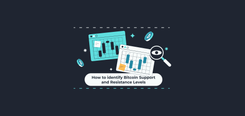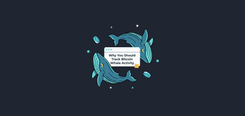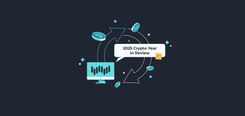What is a DAO? Decentralized Autonomous Organizations (DAOs) Explained
Decentralized autonomous organizations (DAOs) propose a new and improved way of coordinating purpose-driven collective activity. Continue reading to find out how DAOs work and how they fit into the crypto scene.
What is a DAO?
A Decentralized Autonomous Organization (DAO) is a member-owned organized community with no central leadership. The rules for DAOs are described by smart contracts – self-enforcing pieces of code stored on a blockchain.
Despite the lack of hierarchical structure DAOs are proven to be effective in carrying out collective tasks and accomplishing fair distribution of value among members.
At the present time DAOs are commonly used in projects involved in fundraising, investment, gaming, charity and more.
How does a DAO work?
A typical DAO is governed entirely by its members without the intervention of a centralized authority. All decisions in DAOs are made by majority vote.
To become a member of a DAO and participate in the decision-making process on the platform, internet users typically purchase a DAO's governance token. A governance token holder’s voting power is often proportional to the number of tokens they own.
Neither traditional nor decentralized organizations can function without rules. Rules determine behavioral patterns that aid the accomplishment of a shared goal within a community. While in traditional organizations rules are commonly created and enforced by a central authority, DAOs establish regulations by leveraging decentralized smart contracts.
Smart contracts are pieces of computer code stored on a blockchain that enforce contractual agreements between parties. By programming community rules into smart contracts DAOs can ensure fair and transparent distribution of power and value in the community. A DAO’s rules cannot be changed unless voted on by a majority of the governance token holders.
Built on open-source blockchains, DAOs are inherently transparent. Their smart-contract code, built-in treasuries and blockchain records are available for audit to anyone at any time.
Why do we need DAOs?
DAOs have a number of notable advantages over centralized organizations. Here is why it is not impossible that they will soon completely overpower the traditional way of conducting collective activity:
- DAOs are trustless and transparent. Their set of governance rules is executed by computer code instead of a centralized authority. With all the logic for DAO operation being verifiable and open-source it is nearly impossible for its members to commit fraud or behave unfairly towards each other.
- DAOs do not have a hierarchical structure. With every member being able to propose an innovative idea, DAOs may function more effectively than centralized companies. It is generally more likely that the optimal solution to a problem lies in a large pool of ideas rather than in a small one. Any differences in opinion among DAO members are solved via a voting system written into a smart contract.
How to become a member of DAO
At the present time joining a DAO is most commonly done through purchase of a DAO’s governance token. Possession of a governance token grants members the right to vote on major decisions on the platform and receive dividends from the DAO’s investments. A holder’s share of a governance token is usually proportional to the voting power they gain.
List of DAOs to check out
MakerDAO
MakerDAO is a DAO built on the Ethereum blockchain, maintaining a crypto-collateralized stablecoin DAI. The members of MakerDAO have the opportunity to contribute to the operation of one of the leading stablecoin projects in the industry.
Uniswap
Uniswap is a DAO built on the Ethereum blockchain that operates one of the best-known decentralized cryptocurrency exchanges. Uniswap’s governance token UNI provides owners with voting rights on the way the organization is run.
BitDao
BitDao is the biggest DeFi treasury in the world. The goal of the project is to build a shared decentralized tokenized economy and support the development of DeFi. BitDao was created in 2021 by ByBit, a cryptocurrency exchange platform headquartered in Singapore.
DAOs Pros and Cons
Pros:
- Decentralized governance. Decentralized Autonomous Organizations employ distributed governance. Any DAO member has the right to participate in the DAO’s decision-making process.
- Fairness. DAOs strive to ensure that no single member or a group of members is able to make decisions for the entire community.
- Automation. DAOs’ ground rules are laid out via smart contracts – self-executing chunks of code that are stored on a blockchain.
- Transparency. DAOs are built on open-source blockchains. A DAO’s smart-contract code, transaction records, and built-in treasuries are available for audit to anyone at any time.
Cons:
- Abuse of voting power. If a group of investors accumulates the majority of governance token shares, they will be able to influence decisions on DAO governance in their favor, thus creating a hierarchy.
- Regulatory Implications. There is no legal framework yet in place to ensure legal protection for DAO investors. As DAOs can be distributed over several jurisdictions, any legal issues that may arise could result in a complex legal battle.
- Vulnerability of code. Any flaws in the smart contract code can be hard to fix.
FAQ
How does a DAO work legally?
DAOs’ rules are written in smart contracts – pieces of computer code stored on a blockchain. There is currently no legal framework in place to control the operation of DAOs.
What does DAO stand for?
“DAO” stands for “Decentralized Autonomous Organization”.
How to create a DAO?
A DAO launch typically includes 3 major stages: smart-contract creation, funding and deployment. First, developers create fundamental rules by which the DAO will operate, then issue tokens to raise funds, and finally deploy the DAO on a blockchain.
How does a DAO make money?
DAO governance token holders can either profit from dividends from DAO’s investments or from token price appreciation.




